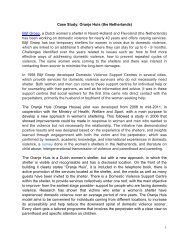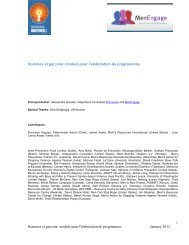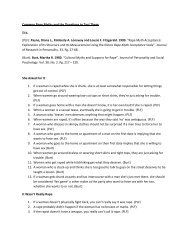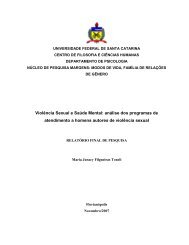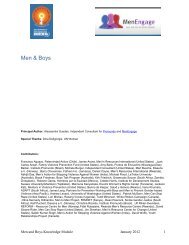Campaigns to End Violence against Women and Girls - Virtual ...
Campaigns to End Violence against Women and Girls - Virtual ...
Campaigns to End Violence against Women and Girls - Virtual ...
Create successful ePaper yourself
Turn your PDF publications into a flip-book with our unique Google optimized e-Paper software.
participa<strong>to</strong>ry assessment <strong>to</strong>ols adapted from community development programmes or<br />
market research. To make campaign moni<strong>to</strong>ring meaningful, data gathered needs <strong>to</strong> be<br />
analyzed in time <strong>and</strong> fed back in<strong>to</strong> the campaign management process. This can be<br />
done most effectively through regular meetings that should be documented.<br />
In most cases, data on three broad aspects is needed:<br />
1. Campaign process - e.g. have activities been implemented as planned; have there<br />
been any delays or other problems; what adjustments have been made? “Internal”<br />
aspects, such as the development of a campaign alliance, management issues or<br />
progress in fundraising, also need <strong>to</strong> be moni<strong>to</strong>red.<br />
2. Campaign outcomes - e.g. does the campaign attain the intended outcomes; what<br />
are the changes or reactions evoked by communications <strong>to</strong>ols used; what attention<br />
does the campaign receive; have any unintended or negative outcomes occurred as<br />
a result of the campaign?<br />
3. External fac<strong>to</strong>rs that may have a bearing on the campaign - e.g. new government<br />
policies that may support or jeopardize the campaign goal; any events that focus<br />
public attention on the campaign issue.<br />
Bear in mind:<br />
When collecting data on individuals, all participants must underst<strong>and</strong> the nature <strong>and</strong><br />
consequences of their involvement in the research. Be sure <strong>to</strong> observe ethical<br />
guidelines for research – see Research ethics.<br />
Asking the target audience<br />
An effective assessment of campaign effectiveness includes measurement of the<br />
changes among target audiences.<br />
Most commonly used <strong>to</strong>ols include:<br />
� Formal quantitative surveys, which at regular intervals track progress <strong>against</strong><br />
the baseline. In behaviour-change campaigns, this can be an effective way <strong>to</strong><br />
moni<strong>to</strong>r changes in knowledge <strong>and</strong> professed attitudes. However, due <strong>to</strong> the<br />
complex pathways of change in violence-related behaviour <strong>and</strong> the social taboos<br />
linked <strong>to</strong> it, direct questioning of audience members, on its own, may not yield<br />
reliable information on behaviour-change. To obtain a fuller picture, direct<br />
questioning needs <strong>to</strong> be combined with other <strong>to</strong>ols, such as observation, role play<br />
or direct response tracking. See Quantitative surveys under Campaign evaluation<br />
in this section, <strong>and</strong> Tools for data collection for types of surveys that can be used.<br />
� Participa<strong>to</strong>ry assessment of process, inspired by community development<br />
methods, which can provide rich qualitative information.<br />
TOOLS FOR DATA COLLECTION<br />
Focus group discussions (FGD)<br />
Focus groups should bring <strong>to</strong>gether 5 <strong>to</strong> 12 participants selected <strong>to</strong> represent the target<br />
audience, or specific segments thereof. Common in evaluation, communication <strong>and</strong><br />
market research, they are a useful <strong>to</strong>ol <strong>to</strong> assess the target audience’s knowledge <strong>and</strong><br />
attitudes <strong>to</strong>wards the campaign issue, or <strong>to</strong>wards the campaign materials <strong>and</strong> messages<br />
(e.g. development of pro<strong>to</strong>types <strong>to</strong> be discussed in focus groups).<br />
It is common <strong>to</strong> offer incentives, such as food, drinks or campaign publicity products (e.g<br />
t-shirts, caps) <strong>to</strong> FGD participants. An effective FGD should last at least one hour. A<br />
269<br />
<strong>Campaigns</strong> December 2011



